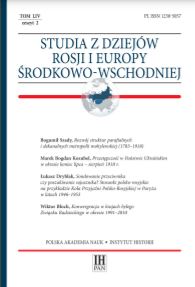Sondowanie przeciwnika czy poszukiwanie sojusznika? Stosunki polsko-rosyjskie na przykładzie Koła Przyjaźni Polsko-Rosyjskiej w Paryżu w latach 1946-1953
Sounding Out the Enemy or Looking for an Ally? Polish-Russian Relations on the Example of the Polish-Russian Friendship Circle in Paris in 1946-1953
Author(s): Łukasz DryblakSubject(s): Christian Theology and Religion, History of Church(es), Diplomatic history, WW II and following years (1940 - 1949), Post-War period (1950 - 1989)
Published by: Instytut Historii im. Tadeusza Manteuffla Polskiej Akademii Nauk
Keywords: Emigration; ecumenism; Prometheism; monarchists; Orthodox Church; Russian political thought; Russian Catholics; Russkaya Mysl’; Vladimir Lazarevsky; Władysław Pelc;
Summary/Abstract: The article deals with the Polish-Russian Friendship Circle operating in Paris in 1947-1953, associated with one of the most widely-read Russian émigré papers Russkaya Mysl’ (“Russian Thought”). Its editor and the president of the Circle was Vladimir Lazarevsky, a Catholic by religion, who gathered around himself a group of Russian propagators of ecumenism. The organisation’s vice-president was Władysław Pelc, the Polish diplomat involved in the Prometheism movement, who decided to get in contact with Russians. The article presents the traditions the Russkaya Mysl’ referred to, a political context and ideologies promoted by this milieu (with particular attention paid to the French and Polish ecumenical aspect), how the Circle operated, and the Poles’ attitude towards this initiative. The reconstruction of opinions of the Russian community was made based on press articles published by the Russkaya Mysl’, which was the Circle’s press organ. The attitude of the Poles towards the group’s activities was reconstructed based on Pelc’s accounts and correspondence of Polish emigrants. Due to a disproportionate engagement of the Polish and Russian parties in the Circle’s activities, the article analyses mainly opinions of the Russian group who dominated the Polish-Russian meetings. While the Russians regarded cooperation with Poles from the perspective of a broader ideological and political project, the Poles approached the group’s activities as opinion polls to check Russian intentions. The Russian project aimed at bringing two nations in emigration together, and after the collapse of the USSR, at joint involvement in a new political project that could be called a Christian European Union, with the participation of Russia playing an essential role in it, and Poland necessary to neutralise national aspirations of Poland’s neighbours. This Polish part was rejected by the Poles, who demanded independence for the Balts, the Caucasus people, Belarusians, and Ukrainians; this threatened the imperial aspirations of the Russians. The Circle ended its activity with Lazarevsky’s death in 1953. His initiative did not bring about a more permanent Polish-Russian cooperation due to the collision of political concepts.
Journal: Studia z Dziejów Rosji i Europy Środkowo-Wschodniej
- Issue Year: 54/2019
- Issue No: 2
- Page Range: 179-218
- Page Count: 40
- Language: Polish

